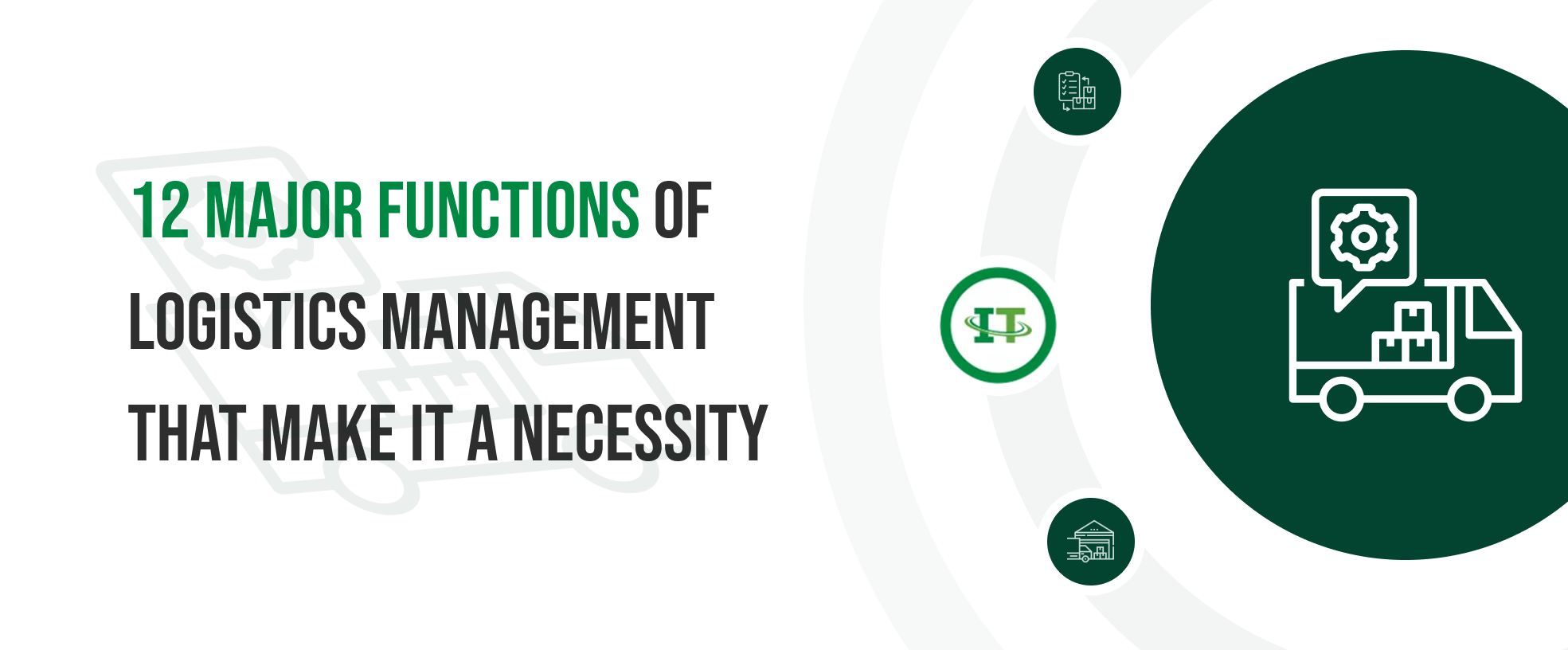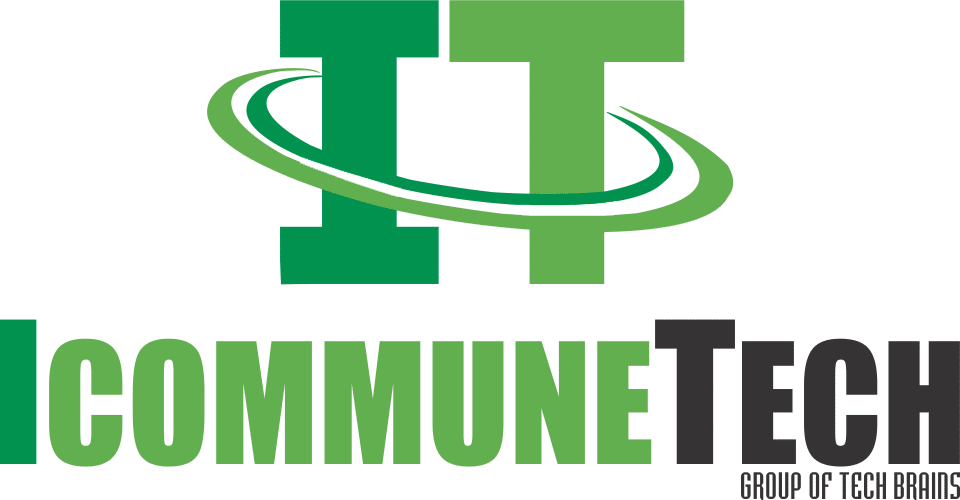What Are The 12 Major Functions of Logistics Management?

Great logistics driven by these core functions of logistics management means great business and constant profits. Are you ready for it?
Logistics management is the fuel on which the vehicle of the supply chain runs silently, yet powerfully. Interested in knowing how products get from their origin to their destination without hassles? Here are the top 12 functions of logistics management that make it indispensable for the supply chains.
What Will We Cover?
- The Key Functions of Logistics Management
- 1. Transportation
- 2. Warehousing
- 3. Order Processing
- 4. Inventory Management
- 5. Material Handling
- 6. Packaging
- 7. Monitoring
- 8. Logistics Information System
- 9. Demand Forecasting and Planning
- 10. Customer Service
- 11. Return & Reverse Logistics
- 12. Procurement
Did you know?
According to Precedence Research[1],
- The global logistics market is estimated to be USD 11.23 trillion in 2025 and will reach USD 23.14 trillion by 2034. It is expected to increase at a CAGR of 8.36% from 2025-2034
- The logistics industry worldwide is expected to reach a projected revenue of US$5,951 billion by 2030, growing at a CAGR of 7.2%.
While, as per the stats by Grand View Research[2],
Stats like these point to the growing importance of logistics management in the current scenario.
Let’s examine the details of the logistics management functions that play an important role in delivering products to you.
12 Major Functions of Logistics Management
Logistics management involves all activities from booking orders until they reach customers. It systematically coordinates the storage, movement, and tracking of goods from a certain point to their final destination.
Here are the core functions of logistics management that can help businesses streamline operations, cut costs, and improve customer satisfaction. Let’s delve into detail to learn its essential functions, which make it all-powerful.
1. Transportation
Transportation is the backbone of any logistics management. It is the process of physically moving goods from one point to another. Whether raw material is heading towards the factory or finished goods are moving to the end customers, transportation plays an important role.
One of the most important functions of logistics management is reducing delays, reducing any risk of damage, and ensuring a timely delivery. This leads to a high customer satisfaction rate and a competitive advantage. A good transportation system has a significant influence on the supply chain.
2. Warehousing
Warehousing means storing goods that are then moved on to distribution and sales. This is where the goods are packed, sorted, and dispatched. These warehouses use automation and a complete warehouse management system to optimize the warehouse space.
Effective logistics management makes the warehousing process effortless and allows for preserving temperature-sensitive supplies.
3. Order Processing
Order processing is essential for customers. It entails receiving orders from customers and fulfilling them. Efficient order processing means goods are delivered to the customers on time. The process means entering orders, double-checking the inventory, confirming orders, invoicing, and scheduling delivery.
Logistics management includes checking the inventory, preparing the invoice, confirming the order, scheduling the delivery, etc. Error-free order processing leads to a high level of efficiency.
4. Inventory Management
This is one of the most important aspects of logistics. It focuses on maintaining stock levels to meet customers’ rising demands and cutting down the cost of storage. This function of logistics management helps maintain the right stocks at all times. The right inventory management can prevent understocks, overstocks, delays, etc.
Maintaining just the right level of stock in the inventory leads to substantial cost savings and prevents the wastage and inconvenience associated with understocks.
5. Material Handling
Material handling in the logistics supply chain means storing, moving, protecting, and controlling the products throughout the logistics process in the warehouses and distribution centers.
Material handling involves streamlining logistics activities using heavy equipment such as conveyors, forklifts, and pallet jacks. Proper material handling serves many purposes. It cuts labor costs and prevents loss and damage in the transit process.
6. Packaging
Packing is one of the most important functions of logistics management. It ensures that the products reach the customers on time and helps with branding. Goods are packed effectively to ensure they arrive at the customers’ in just the proper condition.
Good packaging also leads to better customer satisfaction and a great brand image. The global trend of green logistics has dramatically reduced the adverse environmental impact.
7. Monitoring
One of the key functions of logistics management is monitoring where the goods are. This function is essential for identifying bottlenecks in the supply chain, reducing errors, and improving the service and delivery process. The use of IoT, RFID, GPS, etc., helps improve service levels, leads to a better customer satisfaction rate, and ensures that there are no disruptions and delays.
Monitoring of the products is based on the specific Key Performance Indicators (KPIs), like on-time delivery rate, order accuracy, inventory turnover, transportation cost per unit, warehouse utilization, and much more. These key performance metrics help companies evaluate efficiency of the logistics operations.
8. Information Technology (IT)
In modern times, information technology is an integral part of logistics management. The process involves using software tools like Transportation Management Systems (TMS), Warehouse Management Systems (WMS), and Enterprise Resource Planning (ERP) platforms.
These systems help track shipments, manage inventories, and process orders, which in turn help forecast demands and optimize routes. Useful analytics and data sharing in real time help improve decision-making, transparency, and collaboration in the supply chain.
Check Out CommuteLogix – Logistics Management Software!9. Demand Forecasting and Planning
Forecasting future demands is crucial for a solid logistics plan. Demand forecasting is a function that helps users analyze the latest market trends, evaluate sales data, and identify external factors affecting customers’ requirements.
Accurate demand forecasting helps businesses easily plan their inventory, distribution strategies, production schedules, and distribution strategies. This minimizes the waste, reduces costs, and always maintains the right socks.
10. Customer Service
Customer service is the key aspect of logistics because customers are the kings in the market today. One of the primary functions of logistics management is to ensure timely delivery and that customers know all the details about the goods in transit. Logistics plays a direct role in building a loyal customer base.
When customers get timely deliveries, know where exactly their package is, and can receive shipment updates from time to time, they are more than happy. Transparency in the supplies in the delivery process helps the customers remain happy and satisfied.
11. Return & Reverse Logistics
Reverse and return logistics refer to the processes involved in moving goods from end-users back to sellers and customers. Defective products, end-of-life recycling, repairs, refurbishing, and warranty recovery products are returned in reverse logistics.
Managing the reverse logistics with customer satisfaction reduces the waste of damaged/undesirable products. Reverse logistics is essential for reducing losses and building the brand reputation.
12. Procurement
Procurement is an important logistics management process. It means sourcing and acquiring the raw materials, components, and finished goods required for business operations. It entails selecting suppliers, negotiating prices, managing contracts, and purchasing.
An effective procurement process ensures that only the highest-quality goods are acquired at the right time. It plays a strategic role in controlling the costs, maintaining the inventory levels, and establishing connected supplier relations.
Conclusion
Logistics management is the heart and soul of the supply chain. It entails everything from order processing to transportation and warehousing. Each logistics function is important in moving, storing, and handling goods.
Understanding and implementing the core functions of logistics management will help you gain a competitive edge in the market and a high customer satisfaction rate.
Key Takeaways:
- Logistics management means a smooth flow of goods from the origin to the destination points.
- The main purpose of logistics management is to ease supply chain operations.
- The core functions of logistics management are order processing, inventory, warehousing, packaging, transportation, etc.
- Material handling and logistics information systems are important functions of the supply chain that increase operational efficiency.
- Reverse logistics helps in making sustainability efforts in the supply chain.
Frequently Asked Questions (FAQs)
Whatever your queries may be, just let us know. We will solve the same for you. Answered here are a few commonly asked queries.
1. What is Logistics Management?
Logistics management means planning, executing, and overseeing the movements and storage of goods in the supply chain.
2. What is the importance of logistics management?
The logistics management possesses great importance for businesses as it ensures the efficient movement of goods, storage, delivery, and more. It is like the heart and soul of the supply chain.
3. What are the benefits of Logistics management software?
Logistics management software has several notable benefits. It improves efficiency, reduces costs, and leads to better customer satisfaction.
4. What are the different types of Logistics?
There are different types of logistics , like inbound, outbound, reverse, and third-party logistics.
5. What are the elements of Logistics management?
Logistics management involves elements like planning, inventory, warehousing, packaging, transportation, and other key elements.
Let Your Logistics Run Profitably With iCommuneTech!
At iCommuneTech, you can get advanced and tailored solutions for managing your logistics operations. So, do not wait any longer, Contact us and streamline your supply chains today to make the most of them.
Irshad Pathan

Web Development Expert
Irshad is a senior technical expert at iCommuneTech. He manages the iCommuneTech's Web Development Team, and has hands-on expertise in web development, Laravel development, Logistics, fleet management, and Supply Chain Management. He mentors the in-house team and enjoys describing his experience in words.
Read More Insights By Irshad →